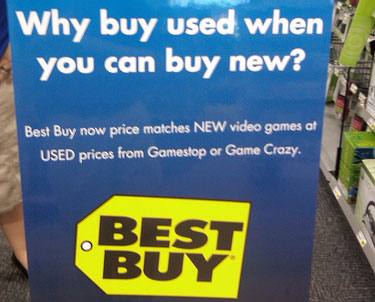Developers want you to purchase games new, as they don't get a dime from people buying games used. That's the whole point of Limited Editions, pre-order bonuses, and for those who do purchased used games, online codes and DLC. Not only has this changed the marketing strategies of games, but it has also changed single-player games, says Silicon Knights boss Denis Dyack:
What’s really happening now is people are starting to say 'why is everyone pushing towards multiplayer?' Because the used game sales are hurting the single player experience so much, they’re being forced in because of the economics, not because people who are doing single player games are saying,’We really want to do multiplayer.' It’s just a survival thing. That’s why I think cloud computing and all those things are really going to do well for the industry. It’s going to take some time, but I think it’s an eventuality.
I think there’s a statistic I saw that most of the boutique retailers are making more money and more sales off of used games than they are off of new games. Those companies are posting record profits and the publishers and developers are laying people off. That’s a very, very, very big problem in our industry.
In other words, the introduction of multiplayer is an attempt to convert gamers who flip their games often into those who keep their games and thus are pressured not to participate in the used market at all. But how successful can this possibly be? Apart from Halo, Gears of War, and Call of Duty – all of which I would describe as multiplayer games that happen to have single-player campaigns – there are hardly any instances of a single-player game with an added multiplayer mode that's so good that it changes their gamer's trading habits.
Nope, not even Assassin Creed: Brotherhood's multiplayer is that good. And let's not even talk about Bioshock 2's. Even a (pretty much) pure multiplayer game like Brink doesn't prevent players from eventually trading it in once they're done with it.
So maybe it's true that, in the not-so-distant future, cloud computing or the transaction system of Steam will take over the industry; likely when the price for a, say, 10 terabyte hard drive becomes affordable. Maybe the time when people stop purchasing physical copies of games in retail stores will come to an end within my lifetime. Maybe then I will stop being asked whether I would like a subscription to Game Informer.










